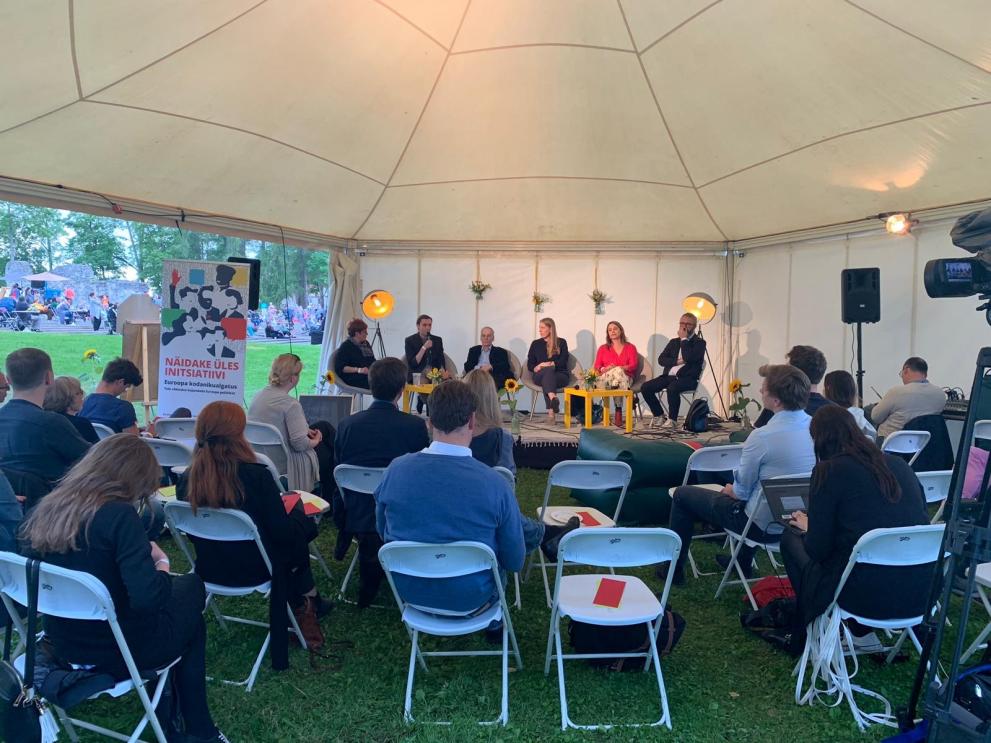
On 9 and 10 August 2019 the European Citizens' Initiative team participated in the Arvamus Festival, in Paide, Estonia to meet citizens passionate about European policies and eager to learn more about the European Citizens' Initiative. Visitors took part in a panel discussion about participatory democracy in the EU and a number of other activities aimed at fostering their knowledge of the tool.
‘European Citizens' Initiative: Participatory democracy for a citizen-based Europe’
Under the title ‘European Citizens' Initiative: Participatory democracy for a citizen-based Europe’, European and national experts in participatory democracy debated on the European Citizens' Initiative as a tool for citizen participation; its similarities and differences with the Estonian Citizens' Initiative and the challenges, solutions and best practices on participatory democracy in Europe.
The debate moderated by Mall Hellam, Executive Director of Open Estonia Foundation,
gathered; György Schöpflin, former Member of the European Parliament and rapporteur on the Regulation on the European Citizens’ Initiative; Pascal Herry, Team Leader for the European Citizens’ Initiative at the European Commission; Pirkko Valge, CEO of Good Deed Foundation; Marta Pardavi, Co-Chair of the Hungarian Helsinki Committee; Martin A. Noorkõiv, CEO of Domus Dorpatensis Foundation, Chair of the board of directors of Good Citizen and Member of the Council of the Network of Estonian Non-profit Organizations.
What does it mean to be an EU citizen and how are the EU institutions getting closer to them?
The meaning of being a European citizen is a primary element to understanding what participatory democracy is. The notion of citizen is central in to the idea of the European Union; any citizen of a Member State is an EU citizen. The European institutions make every effort to bring citizens closer and enable them to be active protagonists in the EU policy system. This is also the case as regards the functioning of the European Citizens’ Initiative. For example, the European Commission led a reform of the tool to make it more user-friendly. It will apply as of January 2020. This reform also includes that the European Parliament will guarantee a greater debate around every successful initiative.
Participatory democracy in Estonia and in the EU: features and challenges
Pirkko Valge (CEO of the Good Deed Foundation) and Martin A. Noorkõiv (Chairman of Network of Estonian Non-profit Organizations) highlighted that EU countries have strong historical differences when it comes to human rights and democracy. Estonia has a recent history of citizen activism and civil society is gradually beginning to take action. Estonian citizens are particularly involved in child and animal protection as well as education and the environment.
Marta Pardavi, co-chair of the Hungarian Helsinki Committee, highlighted the challenges of carrying out a massive campaign for a European citizens’ initiative since it requires bringing together a large number of people and signatures. Running an online campaign through social media also implies some practical and legal obstacles. In this respect, a major issue is that Facebook has introduced very strict rules on political campaigns promotion, which can affect the opportunity for an initiative to be promoted online.
She also compared the situation in Estonia with the case of Hungary. She explained that although Estonia and Hungary have similar instruments of participatory democracy such as referenda, signature collections, online activism tools, crowdfunding campaigns, activism in Hungary is facing a number of obstacles. As an example, Ms Pardavi mentioned the 'Special Immigration Tax'. This rule states that anyone who wants to talk or discuss publicly about immigration must pay a tax as the activity is considered immigration promotion.
In conclusion, the debate ended with the question: ’How can we get greater citizens’ participation in the democratic process?’ The proposed answer was that citizens need to feel like politics is not a ‘dirty thing’ but something good to be part of and that mobilisation is never useless as long as the institutions commit to engaging in a constructive dialogue over the concerns of citizens.



Leave a comment
To be able to add comments, you need to authenticate or register.Comments